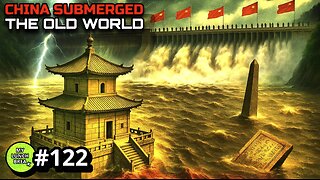Premium Only Content

Episode 1314: The Bible - Book of Samuel II
Here is a summary of the second book of Samuel in the Bible:
• Chapters 1-4: David is proclaimed king of Judah after Saul's death. He then conquers the Philistines and unites the tribes of Israel under his rule.
• Chapters 5-10: David consolidates his power and expands the borders of his kingdom. He defeats the Ammonites, the Moabites, and the Edomites. He also brings the Ark of the Covenant to Jerusalem.
• Chapters 11-12: David commits adultery with Bathsheba and has her husband Uriah killed. Nathan the prophet confronts David and he repents of his sin.
• Chapters 13-19: Absalom, David's son, rebels against his father and tries to take the throne. David is forced to flee Jerusalem, but he is eventually victorious. Absalom is killed and David is restored to the throne.
• Chapters 20-24: David's reign is marked by both success and tragedy. He defeats the Philistines again, but he also loses his son Amnon and his daughter Tamar to violence. David's life ends peacefully and he is succeeded by his son Solomon.
The second book of Samuel is a complex and fascinating book that tells the story of David's rise to power and his reign as king of Israel. It is a story of triumph and tragedy, of sin and redemption, and of God's faithfulness to his people.
Here are some of the key themes of the second book of Samuel:
• The nature of kingship: The book explores the different aspects of kingship, both good and bad. It shows how a good king can lead his people to prosperity and victory, but it also shows how a bad king can lead his people to disaster.
• The relationship between God and David: The book shows how God is faithful to David, even when David makes mistakes. It also shows how David is a flawed man who needs God's forgiveness.
• The importance of repentance: The book shows how David's repentance after his sin with Bathsheba leads to his restoration to God's favor. It teaches us that God is willing to forgive those who repent of their sins.
• The power of God's grace: The book shows how God's grace is at work in David's life, even when he is at his lowest point. It teaches us that God's grace is available to all who need it.
The second book of Samuel is a rich and complex book that has much to teach us about God, kingship, and the human condition. It is a book that is worth reading and studying carefully.
Chapter 1: Saul and his son Jonathan are killed in battle against the Philistines. David is informed of their deaths by an Amalekite who claims to have killed them himself. David mourns Saul and Jonathan, and he sings a lament for them.
Chapter 2: David is anointed king of Judah in Hebron. He faces opposition from Saul's son Ishbosheth, who is proclaimed king of Israel in Mahanaim. Abner, Saul's commander, defects to David's side, but he is later killed by Joab, David's nephew.
Chapter 3: David marries Abner's daughter Michal, and he consolidates his power in Judah. He defeats the Philistines at Keilah, and he is accepted as king by all the tribes of Israel.
Chapter 4: The Philistines capture the Ark of the Covenant, and they take it to Ashdod. David is grief-stricken over the loss of the Ark, but he eventually retrieves it and brings it back to Jerusalem.
These chapters tell the story of David's rise to power as king of Israel. They show how David was a capable and charismatic leader, and they also show how he was a flawed man who made mistakes. The chapters also explore the themes of kingship, the relationship between God and David, and the importance of repentance.
Here are some of the key events that take place in chapters 1-4:
• Saul and Jonathan are killed in battle.
• David is anointed king of Judah.
• Abner defects to David's side.
• Abner is killed by Joab.
• David marries Michal.
• David defeats the Philistines at Keilah.
• The Philistines capture the Ark of the Covenant.
• David retrieves the Ark of the Covenant.
These events set the stage for the rest of the second book of Samuel, which tells the story of David's reign as king of Israel. They also show how David was a complex and flawed man who was both capable and charismatic. The chapters are a valuable resource for anyone who wants to learn more about David and his time as king.
• Chapter 5: David conquers Jerusalem and makes it his capital city. He defeats the Jebusites, who lived there, and he takes the Ark of the Covenant to Jerusalem.
• Chapter 6: David brings the Ark of the Covenant to Jerusalem in a great procession. The people rejoice, and David dances before the Ark.
• Chapter 7: Nathan the prophet tells David that God will build him a house, and that his kingdom will be established forever. David builds an altar for the Ark of the Covenant, and he offers sacrifices to God.
• Chapter 8: David defeats the Philistines, the Moabites, and the Ammonites. He also conquers the Edomites and expands the borders of his kingdom.
• Chapter 9: David befriends Hanun, the king of Ammon. Hanun's officials, however, are jealous of David and they trick him into attacking them. David defeats the Ammonites, but he spares Hanun's life.
• Chapter 10: The Syrians attack David in retaliation for his victory over the Ammonites. David defeats the Syrians, and he captures their capital city, Damascus.
These chapters tell the story of David's consolidation of power and expansion of his kingdom. They show how David was a capable and victorious leader, and they also show how he was a merciful and forgiving king. The chapters also explore the themes of God's faithfulness to David, the importance of repentance, and the power of God's grace.
Here are some of the key events that take place in chapters 5-10:
• David conquers Jerusalem.
• David brings the Ark of the Covenant to Jerusalem.
• Nathan the prophet tells David that God will build him a house.
• David defeats the Philistines, the Moabites, the Ammonites, and the Edomites.
• David befriends Hanun, the king of Ammon.
• David defeats the Ammonites.
• David defeats the Syrians.
These events show how David was a successful and powerful king. They also show how David was a merciful and forgiving king. The chapters are a valuable resource for anyone who wants to learn more about David and his time as king.
• Chapter 11: David sees Bathsheba bathing and lusts after her. He has her husband Uriah killed in battle so that he can marry her.
• Chapter 12: Nathan the prophet confronts David about his sin. David repents of his sin and is forgiven by God.
These chapters tell the story of David's greatest sin, and they show how God's grace can forgive even the most serious of sins. The chapters also explore the themes of temptation, sin, repentance, and forgiveness.
Here are some of the key events that take place in chapters 11-12:
• David sees Bathsheba bathing.
• David has Uriah killed in battle.
• Nathan the prophet confronts David.
• David repents of his sin.
• God forgives David.
These events show how David was a flawed man who was capable of great sin. They also show how God's grace is available to all who repent of their sins. The chapters are a valuable resource for anyone who wants to learn more about David and his relationship with God.
Here are some additional thoughts on chapters 11-12:
• The story of David and Bathsheba is a powerful reminder that no one is immune to sin. Even the greatest of men can fall into temptation and make serious mistakes.
• The story also shows how God's grace is available to all who repent of their sins. David was a sinful man, but he was also a man who was willing to repent of his sins. When he did, God forgave him.
• The story of David and Bathsheba is a reminder that God is always faithful, even when we are not. God forgave David for his sin, and he continues to forgive us for our sins as well.
• Chapter 13: Amnon, David's son, rapes his half-sister Tamar. Tamar is devastated and humiliated, and she tells her brother Absalom what happened.
• Chapter 14: Absalom seeks revenge for his sister, but David refuses to punish Amnon. Absalom then kills Amnon, and he flees Jerusalem.
• Chapter 15: Absalom returns to Jerusalem after three years in exile. He is welcomed back by the people, and he begins to plot to overthrow David.
• Chapter 16: Absalom gathers an army and marches on Jerusalem. David is forced to flee the city, and Absalom takes the throne.
• Chapter 17: David's supporters rally to his side, and they defeat Absalom's army. Absalom is killed in the battle, and David is restored to the throne.
• Chapter 18: David mourns the death of his son Absalom. He is also troubled by the violence that has taken place.
• Chapter 19: David returns to Jerusalem and is welcomed back by the people. He forgives Joab for killing Absalom, and he appoints Solomon as his successor.
These chapters tell the story of David's family tragedy, and they show how sin can have devastating consequences. The chapters also explore the themes of revenge, forgiveness, and the cost of leadership.
Here are some of the key events that take place in chapters 13-19:
• Amnon rapes Tamar.
• Absalom kills Amnon.
• Absalom flees Jerusalem.
• Absalom returns to Jerusalem and takes the throne.
• Absalom is killed in battle.
• David mourns the death of Absalom.
• David forgives Joab.
• David appoints Solomon as his successor.
These events show how David's family was torn apart by sin and violence. They also show how David was a man who was capable of great love and great sorrow. The chapters are a valuable resource for anyone who wants to learn more about David and his family.
Here are some additional thoughts on chapters 13-19:
• The story of Amnon and Tamar is a powerful reminder of the destructive power of sin. Amnon's lust for his half-sister led him to commit a terrible crime, and his actions had devastating consequences for both Tamar and himself.
• The story of Absalom is a reminder that revenge can be a dangerous and destructive force. Absalom's desire to avenge his sister's rape led him to commit murder, and his actions ultimately led to his own death.
• The story of David's family tragedy is a reminder that sin can have far-reaching consequences. David's sin with Bathsheba led to a chain of events that ultimately resulted in the death of his son Absalom.
• Chapter 20: Sheba, a Benjamite, rebels against David and is killed by Joab.
• Chapter 21: David orders that the Gibeonites be avenged for the deaths of their seven sons. He spares their lives after they appeal to him.
• Chapter 22: David sings a song of praise to God. He lists his accomplishments as king and praises God for his faithfulness.
• Chapter 23: David appoints his military leaders. He also gives instructions for his burial.
• Chapter 24: David takes a census of the people of Israel. God is displeased with David for taking the census, and he sends a plague on the people. David offers sacrifices to God, and the plague is stopped.
These chapters tell the story of the end of David's reign, and they show how David was a man who was both loved and flawed. The chapters also explore the themes of justice, mercy, and the sovereignty of God.
Here are some of the key events that take place in chapters 20-24:
• Sheba rebels against David.
• Joab kills Sheba.
• David avenges the deaths of the Gibeonites.
• David sings a song of praise to God.
• David appoints his military leaders.
• David gives instructions for his burial.
• David takes a census of the people.
• God sends a plague on the people.
• David offers sacrifices to God.
• The plague is stopped.
These events show how David's reign was coming to an end. They also show how David was a man who was both loved and flawed. The chapters are a valuable resource for anyone who wants to learn more about David and his time as king.
Here are some additional thoughts on chapters 20-24:
• The story of Sheba's rebellion is a reminder that even a good king can face challenges. David was a beloved king, but he was also a flawed man. Sheba's rebellion showed that David was not immune to challenges.
• The story of the Gibeonites is a reminder that justice is important to God. The Gibeonites had been wronged by Saul, and David was determined to see that justice was done. He avenged their deaths, but he also spared their lives.
• The song of praise that David sings in chapter 22 is a reminder of David's faith in God. David knew that he was a flawed man, but he also knew that God was faithful. He praised God for his many blessings, and he trusted that God would continue to be with him.
• The instructions that David gives for his burial in chapter 23 are a reminder of David's humility. David knew that he was a mortal man, and he did not want to be buried in a grand tomb. He wanted to be buried in the same way as his ancestors.
• The story of the plague in chapter 24 is a reminder of the sovereignty of God. David took a census of the people, and God was displeased. He sent a plague on the people, and many people died. David realized that he had been wrong to take the census, and he repented of his sin.
Conclusion
The second book of Samuel is a story of both triumph and tragedy. It tells the story of David's rise to power as king of Israel, but it also tells the story of his downfall.
The book shows how even a good king can make mistakes. David was a man of great faith and courage, but he was also capable of great sin.
The book shows how God is always faithful, even when his people are not. David's sin led to great suffering, but God forgave him and restored him to his rightful place as king.
The book teaches us that God is ultimately in control, even when things seem to be falling apart. David's story is a reminder that God is always with us, even in our darkest moments.
Here are some of the key themes of the second book of Samuel:
The nature of kingship: The book explores the different aspects of kingship, both good and bad. It shows how a good king can lead his people to prosperity and victory, but it also shows how a bad king can lead his people to disaster.
The relationship between God and David: The book shows how God is faithful to David, even when David makes mistakes. It also shows how David is a flawed man who needs God's forgiveness.
The importance of repentance: The book shows how David's repentance after his sin with Bathsheba leads to his restoration to God's favor. It teaches us that God is willing to forgive those who repent of their sins.
The power of God's grace: The book shows how God's grace is at work in David's life, even when he is at his lowest point. It teaches us that God's grace is available to all who need it.
The second book of Samuel is a rich and complex book that has much to teach us about God, kingship, and the human condition. It is a book that is worth reading and studying carefully.
-
 LIVE
LIVE
After Work Gaming
8 hours ago $1.52 earned“🍺 SOJU SATURDAY “🍺 THE FINALS SEASON 6
176 watching -
 19:01
19:01
Russell Brand
14 hours agoTheo Von Just SHOCKED EVERYBODY With His Take on Trump Tariffs
100K115 -
 14:22
14:22
Tundra Tactical
8 hours ago $5.47 earnedTRUMP DOJ Decides CZ Scorpion Is A Decepticon.
47.2K18 -
 4:53:37
4:53:37
Culturama Podcast
7 hours ago $4.52 earnedEaster Special! Hollow Knight Stream!
39K4 -
 1:04:29
1:04:29
Sarah Westall
10 hours agoThe Philippines and Massive Stores of Gold for all the People of the World w/ Joseph Allain
60.9K45 -
 17:23
17:23
Exploring With Nug
18 hours ago $7.50 earnedCorvette Found Underwater! Continuing The Search For Laresha Walker!
52.4K2 -
 3:06:31
3:06:31
Damysus Gaming
7 hours agoWeaving into the Deep South: South of Midnight First Play! Part 2
12.1K2 -
 24:55
24:55
MYLUNCHBREAK CHANNEL PAGE
14 hours agoDams Destroyed China
72.2K44 -
 5:44:44
5:44:44
BigTallRedneck
8 hours agoFORTNITE - THE QUEST FOR THE OPAL PICKLE
12.5K3 -
 7:05:52
7:05:52
Razeo
11 hours agoEpisode 3: 1st playthrough - Mandragora. What happens when The Pancake King goes eats Waffles?
9.91K